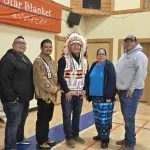
Reconciliation Ally, Treaty Land Sharing Network – making relations
A network of land holders and users is working to uphold treaty rights for Indigenous people to hunt, fish, and gather on treaty land, without fear of punishment.
The Treaty Land Sharing Network (TLSN) was developed by Valerie Zink and Philip Brass in 2018 who saw the need for landholders to better understand their responsibilities as Treaty people and take concrete steps toward sharing land as Treaties intended.
“Around the time of the Colten Boushie trial, there was a lot of racism and calls for the no trespassing act. We wanted to do something to counter that ugly cultural environment in rural Saskatchewan,” said Brass, member of Peepeekisis Cree Nation and advocate for Indigenous rights and environmental protection.
“If we’re really in this so called Reconciliation era in this country, settlers who have the privilege to own land in Treaty territory need to actually honour Treaty,” he said.
Currently, the TLSN on their website about 50 different available locations across Treaty 4 and Treaty 6, including brief descriptions of what users may find on the land, and contact information for each land owner. They are currently developing an updated map to facilitate the use of land in a more accessible way.
“We do have a rudimentary map that we’ve been using since we launched, but it’s pretty out of date,” said Zink.

Photo by Martha Robbins
“We’re looking for some feedback right now from land users as we develop a more detailed map with updated locations and more information.”
Zink said the TLSN hopes to have the new map printed and distributed to interested persons by this fall.
One of the land owners who has taken an active role with TLSN is Tom Harrison, a rancher who owns about 4,000 acres new Regina Beach. Harrison said he has hosted First Nations groups and programs on the land which have focused on subjects like agriculture and grazing management. When he stumbled across the TLSN, he said he was immediately intrigued with the concept.
“Around us, a lot of land is getting farmed and cultivated, but we are a few of the people in the area that retained our wetlands and grass. We have a pretty strong environmental ethic, so (aligning) with the Treaties was important to us,” said Harrison.
The use of Harrison’s land has been modest, with about eight or nine users access his land per year, since joining two years ago. In additional to the educational groups, he’s had users access his land for hunting, and herb and berry gathering, he said.
It’s also fostered relationships with Indigenous land-users, he said.
“It’s been a positive experience. One guy brought me a bunch of wall-eye from up north. And I’m on first name basis with some people I had never met before.”
While co-founder Philip Brass acknowledges the relationships that the TLSN has created, he is no longer involved with the network due to disagreeing with steps land-users take to access land.
“For me, the most important thing isn’t whether we show up and hunt or not. It’s about sending a powerful political and cultural message in this province by putting up a sign that says ‘we respect the right of way for Indigenous people’. They haven’t done that,” said Brass.

Photo by Martha Robbins
According to Brass, potential land-users still need to ask permission to access land, which defeats the purpose of the network. Additionally, he said many hunters or gatherers don’t possess the means, like internet or a cell phone, to communicate with land owners about accessing land.
“It’s not a practical tool for Indigenous hunters, and it’s not addressing the real issue,” he said.
“It’s a club where you go online and get permission. It’s a club for land owners to say they’ve done something to work on Reconciliation. But it doesn’t actually change anything.”
Zink, who co-founded the network with Brass, said the users don’t need to ask permission – that by simply joining the network they’re agreeing to allow all land-users to use the land.
“We do ask that people phone members to notify members before they come because we feel that communication is essential in ensuring everyone’s safety,” said Zink.
Livestock, guardian dogs, other hunters, kids at camp are some of the reasons this communication is important, said Zink.
“It’s not about asking permission, it’s just about notifying land holders that you’re intending to come so they can provide information about potential risks,” she said.
“No one has had a negative experience to my knowledge. We’re committed to keeping it that way to the greatest extent possible, and we really do feel that communication is essential to that.”

